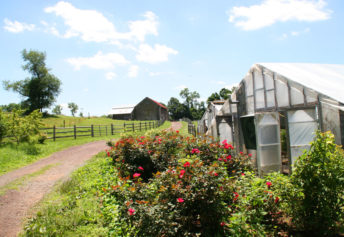Presented by Sustainable Agriculture and Food Systems Funders Join us for a discussion with Representative Chellie Pingree to learn and discuss the bill she recently introduced, H.R. 5861, to address […]
FOCUS AREA: CLIMATE CHANGE
SAFSF uses focus areas to frame our policy, education, networking, and collaboration activities and offer multiple points of intersection for funders across our network.
The Issue
According to the Fourth National Climate Assessment, a federal inter-agency report published by the U.S. Global Change Research Program in 2018:
Rising temperatures, extreme heat, drought, wildfire on rangelands, and heavy downpours are expected to increasingly disrupt agricultural productivity in the United States. Expected increases in challenges to livestock health, declines in crop yields and quality, and changes in extreme events in the United States and abroad threaten rural livelihoods, sustainable food security, and price stability.
The report’s predictions refer primarily to commodity crop and industrial livestock production. It does note that Indigenous knowledge offers important insights and interventions that can inform climate resiliency plans, at the same time that livelihoods of rural communities and Indigenous and Tribal communities face unique and heightened risks from the effects of climate change.
The Connection of Climate to Agriculture, Food, and Fibers
The U.S. Environmental Protection Agency (EPA) reports that agriculture was responsible for about 11% of greenhouse gas emissions in the U.S. in 2021. Estimates that also include factors like fertilizer production, land use, and food waste put agriculture’s share of emissions even higher, at 20-25%. The longer conventional and extractive agriculture production methods dominate, and the longer policies that subsidize them remain in place, the higher this share could climb. Consider this animation from the Environmental Working Group showing current and expected U.S. emissions by economic sector. Emissions reductions in the transportation or residential sectors, without reductions from agriculture, food, and fiber systems, will not stave off the worse impacts of the climate crisis.
Expanding regenerative agriculture practices that originated in BIPOC communities, such as those that prioritize diversified agroecological systems, soil health, livestock grazing at non-industrial scales, etc., present a path forward for sequestering more carbon. Reducing fertilizer usage and curbing food waste are also key strategies to address major sources of agriculture emissions.
Climate and environmental funders should consider the current moment a call to action to harness the power of sustainable agriculture, food, and fiber systems as critical climate mitigation and adaptation strategies. Funding farmers, organizations, researchers, and grassroots advocates on the ground working to advance climate-smart practices, helping these groups access unprecedented federal conservation resources, and advocating for policy change in this sector is essential to ensuring a livable and equitable future.
Role of Philanthropy
Philanthropy has a key role to play in combatting climate change. Funders can support soil health and regeneration programs, diversified agroecological practices, and livestock grazing at non-industrial scales. These programs help create farms that are more resilient in the face of extreme weather events, and that contribute to the climate change solution by sequestering carbon and lowering methane and other harmful emissions. To connect with like-minded food and agriculture funders, become a SAFSF member.
More resources on Fiber-Agriculture-Climate Connections
-
- Textile Exchange Regenerative Agriculture Landscape Analysis: This 2022 report makes the case for the connections between climate and agriculture for the fiber and textile industry, with a strong emphasis on the indigenous roots of regenerative agriculture and the need for equitable financing approaches to share the cost and risk of the transition to regenerative ag. View Textile Exchange’s Climate Vision.
-
- Fibershed’s Climate BeneficialTM certification and related research: Fibershed’s program supports fiber farmers and ranchers in landscape-level stewardship that centers their work to build healthy soil.
SAFSF Featured Content
Dig Deeper
These resources are provided for information only; listing here does not imply an endorsement of any organization or its views by SAFSF.
- Climate Philanthropy Guide
- Climateworks Foundation
- Funding Climate Action: Pathways for Philanthropy
- Climate Change and Philanthropy: A Topic Brief for Donors
- Rural Climate Partnership
- Climate Change Impacts On Agriculture and Food Supply
- Tribal Climate and Conservation
- Federal Strategy to Advance Greenhouse Gas Emissions Measurement and Monitoring for the Agriculture and Forest Sectors
- US Agriculture and the Net Zero Challenge
- USDA Climate Solutions
- USDA Climate Hubs
Also see the multi-sector Funder Toolkit on Climate, Health and Equity, a project of eight philanthropy serving organizations including SAFSF.
Below is a listing of SAFSF programs and resources related to climate change.
Get the First Detailed Overview of Work and Funding at the Intersection of Climate Change, Health, and Equity
In collaboration with Sustainable Agriculture and Food Systems Funders Funders from many different areas are increasingly funding at the intersection of climate, health, and equity—even if they don’t describe their […]
Found in:
WebinarsSoil Health Gaining Ground in State Legislatures
Sponsored by Thornburg Foundation and Sustainable Agriculture and Food Systems Funders Soil health legislation continues to gain momentum in several state legislatures. Join us for a discussion and update on […]
Found in:
WebinarsRegional Conversations Between Philanthropy and State Departments of Agriculture
Sustainable Agriculture and Food System Funders (SAFSF) and the National Association of State Departments of Agriculture (NASDA) are pleased to co-host regional conversations for philanthropy and state departments of agriculture […]
Found in:
WebinarsStories of Creating Sustainable Food Systems on Land and Sea
A pastor, fisherman, and ocean farmer share “real stories” of what it takes to create a just food system, proving that burgeoning markets, environmental stewardship, and supporting communities can coexist. […]
Found in:
WebinarsCollaboration for System Change: Why the Farm Bill Matters
$25 SAFSF Member / $40 Non-member funder 2020 POLICY OUTLOOK AND STRATEGY SERIES: CLIMATE, AGRICULTURE, FARM BILL 2023 Online Funder-Only Event The COVID-19 pandemic has revealed the inequity, fragility and […]
Found in:
WebinarsStories of Creating Sustainable Food Systems on Land and Sea
A pastor, fisherman, and ocean farmer share “real stories” of what it takes to create a just food system, proving that burgeoning markets, environmental stewardship, and supporting communities can coexist. […]
Found in:
WebinarsRegional Conversations Between Philanthropy and State Departments of Agriculture
Sustainable Agriculture and Food System Funders (SAFSF) and the National Association of State Departments of Agriculture (NASDA) are pleased to co-host regional conversations for philanthropy and state departments of agriculture […]
Found in:
WebinarsGet the First Detailed Overview of Work and Funding at the Intersection of Climate Change, Health, and Equity
In collaboration with Sustainable Agriculture and Food Systems Funders Funders from many different areas are increasingly funding at the intersection of climate, health, and equity—even if they don’t describe their […]
Found in:
WebinarsSoil Health Gaining Ground in State Legislatures
Sponsored by Thornburg Foundation and Sustainable Agriculture and Food Systems Funders Soil health legislation continues to gain momentum in several state legislatures. Join us for a discussion and update on […]


